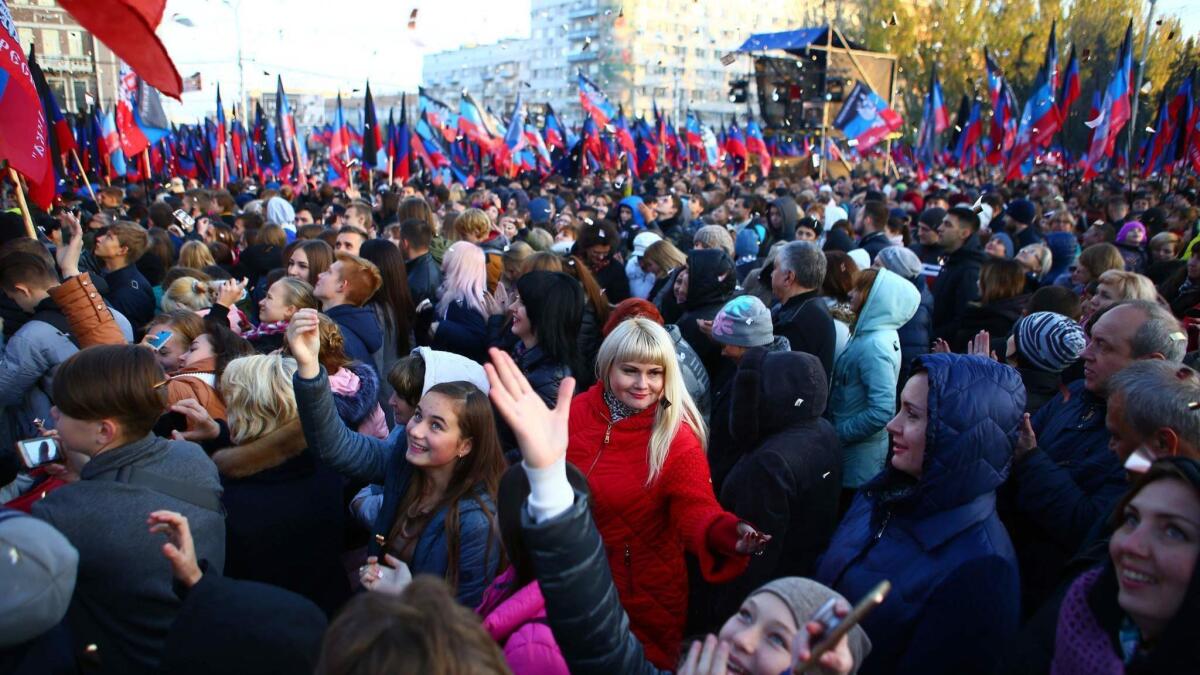Russia offers citizenship to Ukrainians in breakaway regions in a provocative move

- Share via
Reporting from Moscow — Russia said Wednesday that it will offer citizenship to Ukrainians living in the breakaway territories of the country’s eastern flank, a provocative move that President Vladimir Putin signed into law just three days after Ukraine’s presidential election.
The move angered Kiev, where the issue of how to resolve the military conflict in the eastern region of the country was a central point of Sunday’s election. Volodymyr Zelensky, 41, a comedian with no prior political experience, won the election in a landslide with 72% support.
Zelensky, who will be inaugurated in June, said in a statement that Putin’s decision was a “clear confirmation to the world community that the real role of Russia, as an aggressor state, is waging war against Ukraine.”
“Unfortunately, this decree does not bring us closer to the solution of the main task — a cease-fire,” the statement said.
Zelensky defeated incumbent President Petro Poroshenko, who came to power in 2014, just months after Russian-backed rebel militias began fighting the Ukrainian military.
The decree, which was posted on the Kremlin website [link in Russian], will ease the process for getting Russian passports to those living in the self-declared Donetsk and Luhansk people’s republics. The Kremlin said the decision was made “in order to protect the rights and freedoms of man and citizen.”
“This is a duty of Russia to people speaking and thinking in Russian, who are now in a very difficult situation because of the repressive actions of the Kiev regime,” said Vladislav Surkov, a Kremlin advisor on Ukraine. “Ukraine refuses to recognize them as its citizens, introducing an economic blockade, not allowing them to the elections, and using military force against them.”
Ukraine is a bilingual country, with Ukrainian and Russian spoken by nearly all of its 43 million people. While Russian has traditionally been the dominant language in eastern and southeastern Ukraine, the Ukrainian language has seen a revival across the country, despite Putin’s vow in 2014 to defend Russian speakers in Ukraine and around the world.
Russia’s offer of passports would make it more difficult to reintegrate the separatist-held regions, which were once the industrial heartland of Ukraine. It would also give Russia more reason to justify military intervention to defend its citizens abroad.
Poroshenko said Putin’s decision amounted to preparation for the Russian annexation of Ukraine’s Donbass region or for creating a Russian enclave within Ukraine.
“I urge international partners to prevent the worst scenario, severely condemn the destructive and criminal actions of the Russian authorities, as well as to strengthen the regime of international sanctions,” the president tweeted.
The big loser in Ukraine’s presidential election? Vladimir Putin »
Poroshenko oversaw the rebuilding of the Ukrainian military through volunteer fighters and joint military exercises with the United States and other Western nations. The U.S. has sold the Javelin anti-tank missile system to Ukraine to help the country’s fight against the Russia-backed insurgents.
Putin has yet to congratulate Zelensky for winning the presidential election. This week Kremlin spokesman Dmitry Peskov said it was too early for that.
“It will only be possible to judge [him] by his actions,” Peskov told reporters on Monday.
The conflict in the east has been a focal point of the West’s conflict with Russia since its start in 2014. After a protest movement in Kiev ousted Kremlin-favored President Viktor Yanukovich in February 2014, Moscow moved troops into the Crimean Peninsula in the Black Sea, under the pretext that Russia needed to protect the Russian-speaking population there. Moscow annexed the peninsula, an act that remains unrecognized by most of the international community.
Immediately following the annexation, pro-Russia rebels occupied government buildings in the Donetsk and Luhansk regions and declared independence from Kiev. The rebels decried the protest movements in the Ukrainian capital as a fascist coup.
Russia, which has supported the militia-controlled territories with money and fighters, has repeatedly referred to the conflict as a civil war. A peace plan known as the Minsk Agreement was signed by Ukraine and Russia in 2015 but has failed to end the conflict. More than 13,000 people have died and nearly 2 million people have been displaced as a result of the conflict.
Denis Pushilin, head of the self-proclaimed Donetsk People’s Republic, said on the separatists’ official website [link in Russian] that Russia’s decision to allow residents in the territories to apply for citizenship was a “milestone in the history of our young states.”
“We have been waiting for this step for a long time and are immensely glad that this day has come,” he said.
The U.S. Embassy in Kiev condemned Putin’s decision in a tweet Wednesday.
Ayres is a special correspondent.
Twitter: @sabraayres
More to Read
Sign up for Essential California
The most important California stories and recommendations in your inbox every morning.
You may occasionally receive promotional content from the Los Angeles Times.











